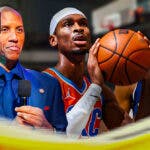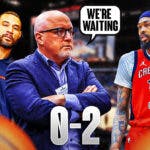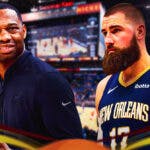New Orleans Pelicans forward Brandon Ingram is entering the final year of his rookie deal, meaning he is eligible for a contract extension and can sign one as long as it beats the Oct. 21 deadline.
But should the Pelicans give an extension to their new youngster?
New Orleans acquired Ingram in the Anthony Davis trade with the Los Angeles Lakers back in June, a package that also included Lonzo Ball and Josh Hart.
While Ball is very talented and Hart is a solid role player, Ingram is viewed by most to be the best prospect out of the group. Many even like his ceiling more than Kyle Kuzma's, the guy the Lakers kept out of the deal.
All of that being said, the Pels should not extend Ingram just yet.
There are numerous reasons why, but let's start with the most obvious one: health.
Since entering the NBA in 2016, Ingram has averaged just 63.3 games per season. He played 79 games during his rookie campaign, but he appeared in only 59 and 52 contests, respectively, the next two years.
Whether it has been nagging injuries like groin and ankle issues or more serious health problems such as blood clots, Ingram has had difficulty staying on the floor, and none of us really know who he is as a player yet as a result.
Obviously, the blood clots, which knocked Ingram out for the remainder of the 2018-19 season back in March, is the most concerning issue here.
Chris Bosh saw his career end because of his problem. So did Mirza Teletovic. Now, it should be noted that in the case of both Bosh and Teletovic, the blood clots occurred in their lungs. Both of those instances were more severe than Ingram's, whose blood clots surfaced in his arm.
Still, Ingram's issue should not be downplayed, as he had to undergo surgery to repair it, and blood clots are blood clots no matter how you spin it.
Now let's focus on his performance on the floor, which has been somewhat underwhelming thus far.
Ingram's counting stats were solid this past season, as he averaged 18.3 points, 5.1 rebounds and 3.0 assists over 33.8 minutes per game, but his shot is still a major question.
Yes, he made 49.7 percent of his field goal attempts, but he connected on just 33.0 percent of his 3-pointers on very low volume (1.8 3-point attempts per game). Additionally, he made only 67.5 percent of his free throws.
Ingram certainly has offensive talent and can get to the free-throw line, but if he can't develop a consistent perimeter jumper, he is always going to be very defensible, especially if he can't hit foul shots regularly.
Defensively, Ingram has all of the tools to be an impact player. He is 6-foot-9 with a 7-foot-3 wingspan. He is athletic. He has good footspeed. But none of that has translated into actual results.
The 22-year-old isn't a bad defender, but he isn't a very good one, either, and his consistency on that end of the floor is night and day. Sometimes, he looks very impressive. Other times, he looks completely lost.
Basically, Ingram has not played enough to be worthy of a contract extension. When he has played, he hasn't played well enough.
If you're the Pelicans, you can't help but think of those blood clots, which is a scary, scary thing.
New Orleans should just let Ingram hit restricted free agency and then work from there.




